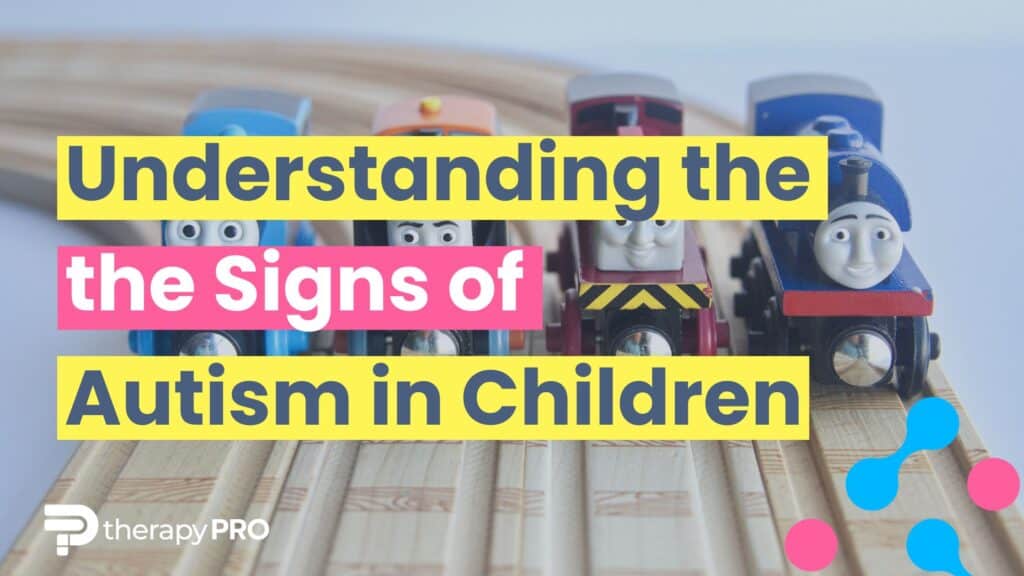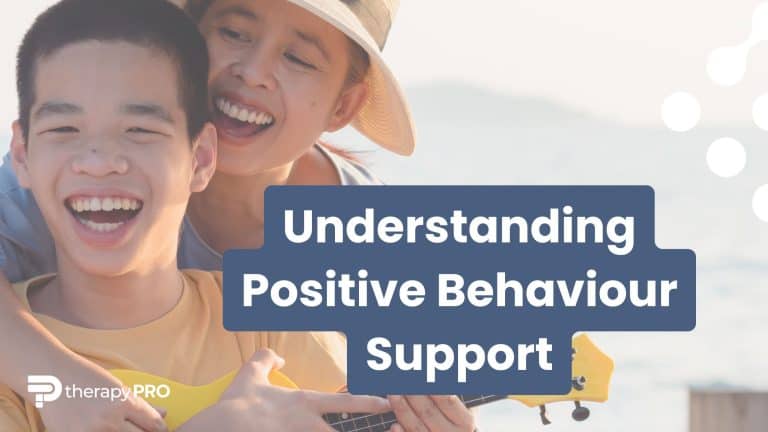Understanding the Signs of Autism in Children
If you are a parent, it’s natural to want the best for your child, and if you suspect signs of autism, you might feel overwhelmed or unsure of where to start.
At our Therapy Pro for Kids autism assessment clinic (based in Melbourne), we understand the importance of early detection and intervention for autistic children.
In this blog post, we’ll discuss what autism is and provide a brief overview of the assessment process we follow at our clinic. If you have a child with autism, you may find this article particularly useful when it comes to supporting loved ones during times of change.
What is autism?
Autism, or Autism Spectrum Disorder (ASD), is a neurodevelopmental disorder that affects communication, social interaction, and behaviour. Autistic individuals may have difficulties with eye contact, speech and language, social interaction, and repetitive behaviours.
The three main areas impacted in ASD include social interaction, communication, and repetitive behaviours.
Understanding these potential differences can help parents recognise the signs of autism and the unique strengths and perspectives of their child, and when to seek appropriate assessment and supports.
Let’s take a closer look at these three areas.
1. How do autistic children interact socially?
Autistic children may approach social interactions and relationships differently. This can come across in a variety of ways, but is commonly observed as making too much, or not enough eye contact, not picking up nor responding to social cues, or preferring not to engage in joint attention. They may also find the need to work harder than others to understand or express emotions or develop friendships.
Social interaction plays an important part of daily life and social development. For autistic children, difficulty with social interaction and struggling to understand social cues may lead to difficulties making friends and feeling isolated. This can have a significant impact on their emotional wellbeing and development, and can sometimes affect their academic and social inclusion.
2. How do autistic children communicate?
Autistic children may experience the following difficulties with their communication:
- Delayed speech or language development,
- Trouble with maintaining conversations,
- Difficulty understanding nonverbal cues, and
- Using repetitive language or echolalia.
Communication difficulties are common for autistic children because they may affect their ability to form relationships with others, express their needs and wants, share their feelings and opinions, and participate in everyday activities.
For example, a child with delayed speech or language development may have difficulty communicating with their parents, siblings, and peers, which can lead to frustration, isolation, and behavioural issues.
Similarly, a child who has trouble maintaining conversations or understanding nonverbal cues may find it more difficult to make friends or participate in group activities, which can impact on their social and emotional development.
In some cases, communication difficulties can also lead to academic challenges if the child is unable to follow instructions or understand classroom activities.
3. What are repetitive behaviours in autism?
Repetitive behaviours or deep special interests can include stereotyped or repetitive movements, insistence on routines or sameness, and a preoccupation with specific interests or topics . Some examples of common topics that may resonate with families include cartoon characters such as Thomas the Tank Engine, collecting items like stones, bottle caps, or Pokémon cards, solving Rubik’s cubes, or having a deep fascination with vehicles like trains, fire engines, and trucks.
Repetitive behaviours can be very beneficial in the role they play to help calm an autistic child’s nervous system or help them manage transitions or unexpected change. These are often referred to as stimming and are well-recognised in the autism community as a response mechanism for individuals.
Repetitive behaviours that impact a child’s ability to function effectively in their daily life may deserve closer attention through an assessment. Repetitive behaviours can cause distress in several way:
- Firstly, if the behaviours take up a significant amount of the child’s time, this may interfere with other activities, such as play or social interactions.
- Secondly, if the behaviours are disruptive or inappropriate within social situations this could lead to social difficulties or misunderstandings with others.
- Lastly, should the child insist on sameness and routine then change or transitions could prove to be difficult for the child to manage, causing distress or anxiety.
Keep in mind that it is the severity and impact of any perceived problems arising with social interaction, communication, and repetitive behaviours that can warrant a parents’ cause for considering an autism assessment.
Not every child that approaches these three areas differently from neurotypical individuals may require a detailed autism assessment.
What are the signs of autism?
It’s important to note that the signs of autism that we’ve discussed can differ among autistic children. Additionally, some children may have subtler signs or present differently, which can make diagnosis challenging.
If you suspect your child is displaying signs of autism, it can be helpful to keep track of different developmental patterns.
Here’s a checklist of some potential and significant milestones to look out for:
- By 6 months: No big smiles or other warm, joyful expressions.
- By 9 months: No back-and-forth sharing of sounds, smiles, or other facial expressions.
- By 12 months: No babbling or gesturing, such as pointing or waving.
- By 16 months: No spoken words.
- By 24 months: No meaningful two-word phrases or any loss of previously acquired language or social skills.
To recap our earlier section, it might also be worth noting if your child demonstrates:
- Delayed or absent language development.
- Lack of eye contact or social interaction.
- Difficulty with social communication, such as maintaining a conversation or understanding nonverbal cues.
- Repetitive or restricted behaviours, such as flapping hands, spinning objects, or fixating on specific interests or topics.
- Unusual sensory experiences, such as being overly sensitive or under-responsive to sounds, textures, or tastes.
If you’re concerned about your child’s development, seek guidance from a healthcare professional or specialist in autism assessment.
About the autism diagnosis and assessment process
Assessments for autism involve a comprehensive evaluation of the child’s behaviour, development, and history.
There are various reasons why a parent may seek an autism assessment for their child but not require an official diagnosis.
Should parents wish to access funding to support therapeutic interventions and programs for their child, then they will require a formal diagnosis. Diagnosis is commonly made based on the diagnostic criteria in the Diagnostic and Statistical Manual of Mental Disorders, Fifth Edition (DSM-5).
In this section we’re going to answer some common questions about the diagnosis and assessment process that we follow in our Therapy Pro for Kids assessment clinic.
What does an assessment process involve?
Here at Therapy Pro for Kids, the assessment process typically involves a multidisciplinary team of healthcare professionals, including a psychologist, speech pathologist, and occupational therapist, who will evaluate your child’s behaviour, communication, and social interaction skills. The team may also review medical records and conduct developmental assessments.
The assessment process can take several sessions to complete, and the length of time can vary depending on your child’s age, developmental level, and specific needs.
However, the goal of the assessment is to provide a comprehensive understanding of your child’s strengths and challenges, which will inform the development of an individualised report.
Why seek an autism assessment for your child?
It’s important for parents to understand the benefits of seeking an assessment for a child who may have autism.
An accurate diagnosis can provide access to a range of support and services, such as early intervention programs, specialised therapy, and funding assistance, that can help autistic children reach their full potential.
Will I have access to funding assistance?
There are Medicare items available to help support early diagnosis and ongoing treatment for parents with autistic children . The Helping Children with Autism program offers early intervention services. There are some rules in place, and you can review the details over on the Department of Human Services website.
Some children with ASD can access funds via the National Disability Insurance Scheme (NDIS) however eligibility is based on reduced functional capacity in two or more areas. A child diagnosed with ASD who has functional capacity impairments in several areas will likely meet access criteria, however not always. The Autism Australia and NDIS websites provide more information.
Getting help for your autistic child
The earlier a child receives appropriate intervention and support, the more likely they are to achieve positive outcomes.
Seeking help for your autistic child can provide access to various forms of support and funding, depending on the support needs of your child.
In addition to a formal diagnosis, various interventions and supports are available to help families. These may include therapy, social skills programs, and educational support.
At our assessment clinic, we understand that seeking help for your child can be a difficult and overwhelming process. We are here to support families throughout this journey by providing accurate information, guidance, and support every step of the way.
How to book in an assessment
Our assessments are conducted by experienced health professionals and are tailored to each individual child’s needs.
Here’s how you can book in an assessment:
1. Fill in the form on our assessment clinic page so that we have your best contact details.
2. A member of our client support team will contact you to better understand your child’s needs and determine if the assessment clinic is right for you. They will chat through payment options and if appropriate, book in a meeting with a Key Worker.
3. A Key Worker will contact you to gather information about your child’s unique needs, confirm a quote for you, and book in the first session.
4. You and your child will attend their first session at our Melbourne clinic.
5. We may require multiple sessions to gather the relevant diagnostics required.
6. You will receive a report on our findings that you can then take to your child’s paediatrician or psychiatrist. The Key Worker will also provide you with a full verbal explanation of the assessment results and recommendations in a parent meeting
Wrapping up
Remember: if you suspect your child is showing signs of autism or is diagnosed with ASD, early intervention is key to supporting them to reach their goals.
ASD is a life-long neurodevelopmental disorder that affects communication, social interaction, and behaviour. Presentations can differ between children, and not all children will require ongoing therapy or supports to live their lives independently.
This flyer providers information about our assessment clinic and the services our Therapy Pro for Kids therapists offer.
We are here to help and support you and your child. If you suspect that your child may have autism or are concerned about their development, we encourage you to contact our clinic to begin the assessment process or fill in the form below:




